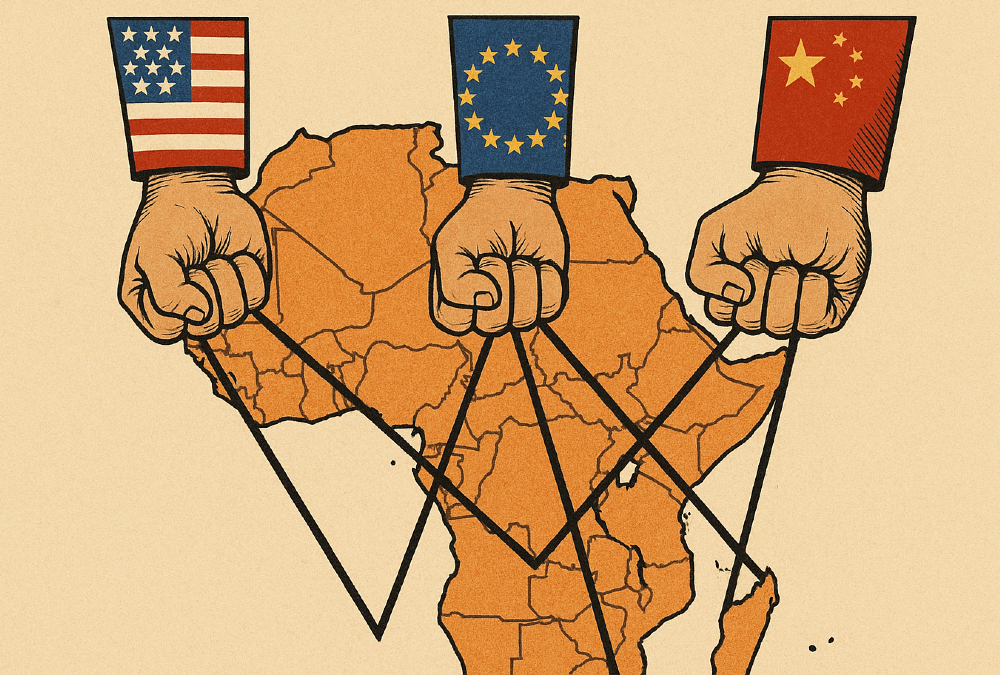A Diaspora View of Africa
Foreign Intervention in Africa Continues


By Gregory Simpkins
Since the Scramble for Africa in the 1880s, and in fact even before then, various foreign nations have had an abiding interest in manipulating African governments in order to secure their resources. Ivory, gold, diamonds, petroleum, and more recently critical minerals such as cobalt, lithium and other raw materials have attracted the active interest of foreign powers.
When colonial control gradually faded in Africa, it was replaced by neocolonialism, which amounted to control from advisors and partners within African countries. However, that was not the only tool of foreign intervention in Africa.
Cold War Rivalries and Proxy Conflicts
Following World War II, the United States and the Soviet Union competed in what was called the Cold War. It was called cold because the two superpowers didn’t fight directly; they used proxy forces within African countries – supplying them with funding, weapons and logistical support, as well as troops in some cases.
To be sure, there were internal conflicts within these countries outside of any conflict instigated by foreign nations, but these domestic disputes were aggravated and in some cases were expanded by outside sponsors competing on ideological grounds.
In Angola, the Soviet Union supported the choice of the Popular Movement for the Liberation of Angola (MPLA). In this intervention, they had the collaboration of tens of thousands of Cuban troops.
The competing alliance consisted of the United States and South Africa, with Zairean troops, supporting the National Union for the total Independence of Angola (UNITA) and the National Front for the Liberation of Angola (FNLA). This ideological battleground led to decades of conflict that killed and maimed untold thousands of Angolans.
The mines both sides laid plagued agriculture in the country long after the fighting was ended officially.
Another ideologically based conflict in Africa involved Somalia and Ethiopia. The United States had supported the monarchy of Haile Selassie until he was overthrown in 1974 by a Marxist movement supported by the Soviets.
The Soviets had supported Somalia, which under Mohamed Siad Barre following the 1969 coup had declared itself a socialist nation until that government invaded Ethiopia in the Ogaden War from July 1977 to March 1978.
According to Elizabeth Schmidt, a professor emeritus of history at Maryland’s Loyola University from her book Foreign Intervention in Africa After the Cold War, the United States came in, hoping to use Somali as a counterweight to the more Marxist Ethiopian government. The Soviets, who had supported Somalia and then Ethiopia post-coup, had tried to have it both ways, being involved with Somalia and with Ethiopia at the same time, but the Ogaden War ended that effort, and in the space of less than a decade, the US and the Soviet Union has switched allies in the Horn of Africa.
African nations must cease making themselves attractive targets for foreign intervention. Clearly, such foreign involvements have not worked to the benefit of these countries and their citizens
Neither superpower made conditions better for citizens in either country. Ethiopians suffered under the brutal Derg government until it was ended in May 1991 as the regime fell to the Ethiopian People’s Revolutionary Democratic Front (EPRDF).
As for Somalia, the United States poured resources into that country to oppose the Soviet ally across the border, but the failure of Siad Barre’s effort to unite the clans under a socialist umbrella led to decades of internal conflict that continues to this day.
China, a leader in the Non-Aligned Movement and now itself a global superpower, was involved in more than one African liberation movement. In Zimbabwe, China allied with the Zimbabwe Africa Peoples Union (ZAPU) founded by Joshua Nkomo.
Meanwhile, the Soviets allied with the rival Zimbabwe African National Union (ZANU). Of course, it is a bit more complex than that as the Soviets were initially in league with Nkomo.
The political and ethnic tension between Joshua Nkomo’s ZAPU and Robert Mugabe’s ZANU led to open conflict. The Chinese-Soviet support for Zimbabwe’s independence did not extend to a successful effort to create a unified liberation movement.
The intervention of South Africa also didn’t aid in uniting the two liberation wings; to the contrary, it served South Africa’s interests in the region to keep Zimbabwe internally divided.
So, foreign interventions on behalf of African allies needing assistance to overcome internal or external competitors on the continent have been far from a success. Living with the aftermath of these disastrous efforts would be bad enough, but foreign intervention continues and threatens even further perilous outcomes in African countries.
Emerging Players and Modern Interventions
We are in an age in which the colonial-superpower dynamic isn’t the only source of foreign intervention in Africa. New players, such as Japan, South Korea, Turkey and even Iran have expressed interest in Africa and exerted their influence.
In a September 11 2024 article in New Lines Magazine, writers Hassan Hassan and Rana Mamdouh stated that the Gulf states of the Middle East passed through pan-Arabist and pan-Islamist phases and are now in a phase that focuses on their interest in African resources and regional political power. “There are historical precedents for major Arab powers providing support to African nations, as an aspect of anti-colonial and Cold War politics.
In the early 1960s, Gamal Abdel Nasser sent Egyptian troops to Congo to support Patrice Lumumba’s government as part of his broader anti-imperialist and pan-Africanist agenda during the Congo Crisis, the article asserted. “Libya’s Moammar Gadhafi sought to assert his influence in Africa through economic and political cooperation, and the Gulf countries have long pursued interests in the region – as Saudi Arabia did via the clandestine U.S.-led Safari Club alliance of intelligence agencies in the 1970s, and the United Arab Emirates has in Seychelles over the past two decades.”
The latest African target of foreign intervention appears to be Sudan. Between 2014 and 2015, Saudi Arabia and UAE influence in Sudanese politics increased under President Omar al-Bashir.
Both monarchies wanted to counter Iran’s ability to project power into the Red Sea and in Yemen. In 2015, after breaking off relations with Iran, Sudan contributed 10,000 troops to a Saudi-led military operation in Yemen to fight Houthi rebels.
Both the Sudanese army and paramilitary forces took part, and personal links were forged. In the post-Bashir era that began in 2019, Saudi and UAE influence has continued to grow, thanks to those direct links.
In general, the New Lines article stated that both monarchies are status seekers. In a changing international context, Sudan is a testing ground for their ability to influence and shape future political settlements.
Now that RSF has declared a breakaway region of Sudan, foreign intervention could become more prized given the resources in the country’s Darfur region such as uranium and now gold.
The United Nations and international human rights groups are clamoring for an end to the conflict between the Sudanese Armed Forces (SAF) and the militia Rapid Support Forces (RSF). Since war erupted on April 15 2023, some estimates state that as many as 150,000 people have been killed.
Untold numbers have been injured or sickened, and nearly 13 million people have been displaced, with no political solution in sight despite repeated efforts to bring the conflict to an end. The fighting began after months of tension between Sudan’s military and the RSF, once close allies who jointly led the 2021 coup that derailed a civilian-led transition.
As the Sudan conflict nears its second anniversary, the UN Office for the Coordination of Humanitarian Affairs (OCHA) warned on Monday that the fighting near el-Fasher, which has been under an RSF blockade, is hampering access to humanitarian assistance.
“Thousands of displaced people are trapped and cut off from aid,” OCHA Sudan said in a social media post. “Hostilities must stop now. All those engaged in the conflict must ensure safe passage for civilians and humanitarian access.”
African nations must cease making themselves attractive targets for foreign intervention. Clearly, such foreign involvements have not worked to the benefit of these countries and their citizens, and there is no reason to believe this long trend will be reversed.
Gregory Simpkins, a longtime specialist in African policy development, is the Principal of 21st Century Solutions. He consults with organizations on African policy issues generally, especially in relating to the U.S. Government. He further acts as a consultant to the African Merchants Association, where he advises the Association in its efforts to stimulate an increase in trade between several hundred African Diaspora small and medium enterprises and their African partners.

